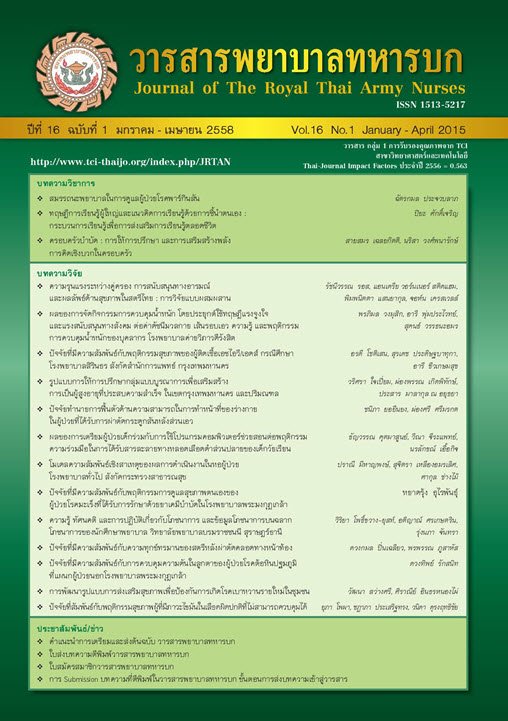การพัฒนารูปแบบการส่งเสริมสุขภาพเพื่อป้องกัน การเกิดโรคเบาหวานรายใหม่ในชุมชน The Development of Health Promotion Model for Prevention New Cases of Diabetes Mellitus in Community
Keywords:
วิจัยเชิงปฏิบัติการ, การพัฒนารูปแบบการส่งเสริมสุขภาพ, การป้องกันการเกิดโรคเบาหวานรายใหม่ในชุมชน ปัจจัยที่มีความสัมพันธ์, ความดันในลูกตา, ผู้ป่วยโรคต้อหินปฐมภูมิ, Factor Associated, Intraocular Pressure, Primary Glaucoma Patients, Action ResearchAbstract
การวิจัยเชิงปฏิบัติการ มีวัตถุประสงค์เพื่อ 1) พัฒนารูปแบบการส่งเสริมสุขภาพเพื่อป้องกันโรคเบาหวานรายใหม่ในชุมชน 2) เปรียบเทียบพฤติกรรมส่งเสริมสุขภาพเพื่อป้องกันโรคเบาหวานรายใหม่ในชุมชนก่อน และหลังการเข้าร่วมกิจกรรมการพัฒนา รูปแบบใช้กรอบแนวคิด Community Health Improvement Process (CHIP) Model การดำเนินการวิจัยแบ่งเป็น 3 ระยะ ได้แก่ 1) ระยะก่อนการพัฒนารูปแบบ เป็นการวิเคราะห์สถานการณ์ปัญหา 2) ระยะพัฒนารูปแบบ เป็นการพัฒนาทีม และการจัด กิจกรรมโครงการส่งเสริมสุขภาพ และ 3) ระยะประเมินผล ดำเนินการวิจัยในพื้นที่คือหน่วยบริการปฐมภูมิที่ให้บริการสำหรับ ประชาชน 13 หมู่บ้าน เลือกกลุ่มตัวอย่างแบบเฉพาะเจาะจงเก็บรวบรวมข้อมูลโดยการสนทนากลุ่ม และแบบสอบถาม สถิติที่ใช้ ได้แก่ ความถี่ ค่าเฉลี่ย ส่วนเบี่ยงเบนมาตรฐาน Paired t- test และการวิเคราะห์เนื้อหา ผลการศึกษา ค้นพบองค์ประกอบที่สำคัญ จากการดำเนินโครงการตามรูปแบบที่พัฒนาขึ้น 6 กิจกรรม ได้แก่ 1) การทำประชาคมอย่างมีส่วนร่วม 2) การติดตามประเมินผล 3) การวิเคราะห์และค้นข้อมูลให้ชุมชน 4) การสร้างแรงบันดาลใจด้วยการศึกษาดูงาน 5) การให้ความรู้ 6) การทำด้วยใจ 7) การวิเคราะห์กิจกรรม 8) การเตรียมภาคีเครือข่าย 9) การเดิน วิ่งเพื่อสุขภาพ ซึ่งเรียกโดยรวมว่า “PE DM KHWAO Model” ภายหลังการพัฒนา พบว่า กลุ่มตัวอย่างมีคะแนนพฤติกรรมสุขภาพในด้านการบริโภคอาหาร การออกกำลังกาย การจัดการอารมณ์ และความเครียดเพิ่มขึ้นมากกว่าก่อนการพัฒนาอย่างมีนัยสำคัญทางสถิติที่ระดับ 0.05 ส่วนพฤติกรรมสุขภาพด้านการสูบบุหรี่ และการดื่มเครื่องดื่มแอลกอฮอล์เพิ่มขึ้นมากกว่าก่อนการพัฒนาอย่างไม่มีนัยสำคัญทางสถิติผลการศึกษา ชี้ชัดว่า รูปแบบการส่งเสริมสุขภาพเพื่อป้องกันโรคเบาหวานรายใหม่ในชุมชน “PE DM KHWAO” model ช่วยเพิ่มระบบการดูแลที่เหมาะสมโดยชุมชนและช่วยส่งเสริมพฤติกรรมสุขภาพ ปัจจัยความสำเร็จของรูปแบบ คือ การมีส่วนร่วม ดำเนินการโดยภาคประชาชนการสื่อสารและกระบวนการดำเนินงานที่เกิดจากแผนที่คิดร่วมกัน ซึ่งทำให้เกิดการส่งเสริมสุขภาพ ที่หลากหลาย และเป็นการป้องกันการเกิดผู้ป่วยเบาหวานรายใหม่ในชุมชนอย่างมีส่วนร่วม
The purposes of this action researchwere to 1) develop the health promotion model for prevention New Cases of Diabetes Mellitus in Community 2) compare health promotion behaviors before and after participation in the program. Base on Community Health Improvement Process (CHIP) Model, The research process devided into three phases. Phase 1 Pre - Developed Model with situation analysis. Phase 2 modeldevelopment by promoting health personal team and health promotion program. Phase 3 model evaluation. The research field was the primary care unit with 13 services villages and the sample group were selected by purposive sampling. Data were collected through focus group andhealth behavior questionnaire. Statistical devices used in data analysis were frequencies, means, standard deviations, paired t-test and content analysis. The major findings revealed that health promotion model should consist of 6 activities. Key components were P: Participation, E: Evaluation, D: Data, M: Motivation, K: Knowledge, H: HEART, A: Analyze, O: Overture, W: Walk and Run that call “PE DM KHWAO” model. Moreover, the sample group had scores of eating behavior, exercise and stress management higher than those before participation program with statistically significance (p < 0.05). However, Smoking and Alcohol consumption had scores higher than those before participation with non-statistically significance.
The result of the research showed that “PE DM KHWAO” model enhance the appropriate care system and health promotion behavior. The keys success factors were Community Actor Information and process.
Downloads
Downloads
How to Cite
Issue
Section
License
บทความหรือข้อคิดเห็นใดใดที่ปรากฏในวารสารพยาบาลทหารบกเป็นวรรณกรรมของผู้เขียน ซึ่งบรรณาธิการหรือสมาคมพยาบาลทหารบก ไม่จำเป็นต้องเห็นด้วย
บทความที่ได้รับการตีพิมพ์เป็นลิขสิทธิ์ของวารสารพยาบาลทหารบก
The ideas and opinions expressed in the Journal of The Royal Thai Army Nurses are those of the authors and not necessarily those
of the editor or Royal Thai Army Nurses Association.






